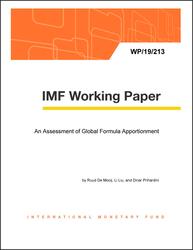
An Assessment of Global Formula Apportionment
Formula apportionment as a way to attribute taxable profits of multinationals across jurisdictions is receiving increased attention. This paper reviews existing literature and discusses experiences in selective federal states to evaluate the economic properties of formula apportionment relative to the current international tax regime that is based on separate accounting. It highlights major advantages, such as the elimination of profit shifting within multinational groups; and it discusses new distortions and the impact on tax competition. The analysis exploits different datasets to assess the direct revenue implications for individual countries under alternative formulas. The distributional effects across countries are found to be large, reflecting major discrepancies between where profits are currently attributed and where factors of production are located or sales take place. The largest losses appear in investment hubs (i.e. countries with a disproportionate ratio of foreign direct investment to GDP), while several large advanced countries are likely to gain. Developing countries gain most likely if employment receives a large weight in the formula; they also tend to benefit, on average, from a formula based on sales by destination.
Publication date: October 2019
ISBN: 9781513516257
$18.00
Add to Cart by clicking price of the language and format you'd like to purchase
Available Languages and Formats
| English |
Prices in red indicate formats that are not yet available but are forthcoming.
Topics covered in this book
This title contains information about the following subjects.
Click on a subject if you would like to see other titles with the same subjects.
International corporate taxation , Multinationals , Formula apportionment , , WP , MNEs , ORBIS , MNE , tax base , high-tax
Summary
Copyright © 2010 - 2026
Powered by:
AIDC



